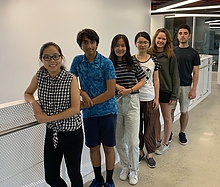Summer Interns Burst Into the World of Bioinformatics and Computational Biology

A group of six students are spending much of this summer in the Center for Bioinformatics and Computational Biology (CBCB), collaborating with University of Maryland faculty and graduate students on projects ranging from identifying novel viruses to utilizing synthetic lethality to improve cancer treatments.
The students—who range from a rising college senior to a rising high school junior—are part of a 10-week long internship run by faculty in CBCB, with additional support coming from Illumina, a U.S. company focused on developing genomic analysis tools.
“We’ve been doing this for several years and find it valuable for our faculty and the students involved—both the visiting students and our own graduate students,” says Michael Cummings, a professor of biology and the director of CBCB.
The goal of the program, Cummings says, is to give young scientists a hands-on research experience in bioinformatics, letting them work side-by-side with faculty on complex research problems being investigated in CBCB.
Tracy Chen, a second-year UMD computer science doctoral student who is leading the interns, says she enjoys working with the “incredibly talented” group of students.
“I enjoy having one-on-one meetings with the interns every week to learn their research status and also what’s going on in their life, as well as organizing weekly internship seminars,” she says. “When the program finishes next month, I hope our interns will have learned more aspects of bioinformatics through our seminars in addition to their focused research areas. And since our interns come from different schools, I also hope they are making friends from across the country.”
Marie Crane, a rising senior majoring in biology at Macalester College in St. Paul, Minnesota, says CBCB’s program was a perfect fit since she was searching for an internship in computational biology or bioinformatics.
Crane is working with Mihai Pop, a professor of computer science and director of the University of Maryland Institute for Advanced Computer Studies (UMIACS), to develop a method to identify novel viruses. Specifically, she is working with metagenomic data from the hot springs at Yellowstone National Park.
“Participating in this program has been challenging in a good way for me,” Crane says. “I’ve been able to use more computational methods and learn more about coding than previous internships I’ve had. The resources I have had access to at CBCB have also been really helpful in completing my research.”
She adds that she feels lucky to be collaborating with Pop.
“Working with Mihai is great,” Crane says. “He is a very big figure in the field, so it is definitely a privilege to be able to work with him this summer.”
Jessica Pan, an incoming freshman at Yale University, says she felt compelled to apply for the program because of how CBCB is combining classical biology with new technologies. She is specifically interested in how these new advances are impacting the medical field.
“They’re really pioneering the way here,” Pan says. “I love the professors and my co-workers—it’s just a really incredible place to work.”
Pan is working on a project involving a gene-pair relationship called synthetic lethality, in which inactivation of both genes is lethal to a cell, but inactivation of one gene by itself is not. In cancer cells where mutations inactivate one gene, drugs inhibiting the partner gene would be lethal to cancer cells but have minimal or no effect on healthy tissue in which the first gene is expressed normally.
“That’s really important because with things like chemotherapy and typical radioactive treatments, you’re harming a lot of the patient’s healthy cells while you’re trying to kill the cancerous cells,” Pan says. “So this is a really great way to minimize the side effects and the adverse impact of cancer therapy. It’s a pretty new field, but it’s one that I find really interesting.”
Her mentor is Sridhar Hannenhalli, a professor of cell biology and molecular genetics.
“Dr. Hannenhalli is really engaged and involved,” she says. “Whenever we have any issues, he is always available to talk. In previous internships I’ve had, that has not really been the case. It’s nice that we are getting so much guidance from the people running this program.”
Other students participating in the CBCB program this summer are: Camilo Calvo-Alcaniz, a rising senior double majoring in computer science and pre-medicine at UMD; Kassie Wang, an incoming freshman at Cornell University; Hyeyun Chae, a rising junior double majoring in biology and computer science at Swarthmore College; and Rajit Mukhopadhyay, a rising junior at Montgomery Blair High School.
At the end of the summer, the six interns will put together a report outlining the results of their research and give a short presentation about their projects.
—Story by Melissa Brachfeld
From left in photo: Kassie Wang, Rajit Mukhopadhyay, Jessica Pan, Tracy Chen, Marie Crane and Camilo Calvo-Alcaniz. Not pictured: Hyeyun Chae.
